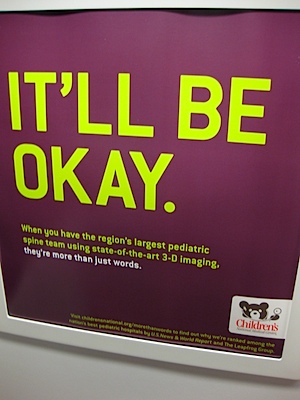When I read these I thought about what my opinion was about them, and what I might write in a blog post about them. I didn’t really want to critique their opinion or lay mine on top, because I think the pieces stand up well on their own, and I am no more connected to the facts than these authors are.
So I thought I’d just end up writing a post that said that I read these articles (I know, uncharacteristic of me).
Then, I stepped on the Washington, DC Metro, and this advertisement, for a local hospital stared me in the face:
I looked at it several different ways – on the one hand, the implication is that if your child has a serious spine problem, they will take care of it. However, if you do not have a child with a serious spine problem, should you go elsewhere for primary care, or are they good at that, too?
Is 3-D imaging today’s marker for quality health care? That’s what brought me back to the point of these three pieces.
In my travels, I don’t often see advertising for health care organizations that say, “Come to us for your primary care, your child is more likely to be immunized by us.” Or, “Come to us for all of your care – we’ve been rated the best listeners in DC.”
Here’s another example from my Twitterfeed. How did health care come to this?
What these pieces do for me is support the work to move to a system where the customer is the patient. The care experience should be as good as any a person can get from any other industry, online or offline, and one that is accountable to it for the things patients care about. It’s not how many personal health records there are, but how often patients and families make meaningful decisions to stay healthy because of them.
For me, this is where the energy comes from around patient access, patient and family involvement in care, and in the design and improvement of the health system.
Finally, I just re-acquainted myself with this quote yesterday, from my reading of A Fortunate Man, by John Berger about a country doctor in 1967. Here’s what the author said about computers in medicine back then.
It may be that computers will soon diagnose better than doctors. But the facts fed to computers will still have to be the result of intimate, individual recognition of the patient.
Was he right? (rhetorical question)



